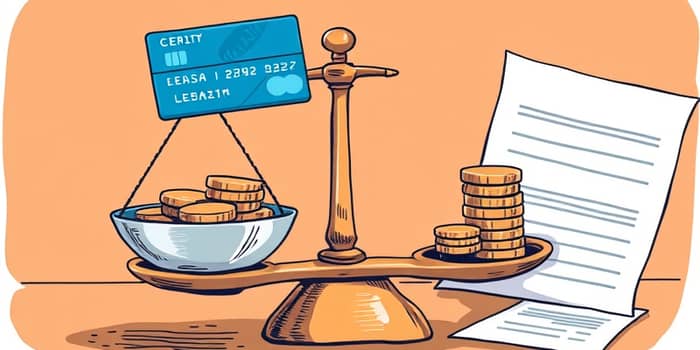
Making informed financing decisions can transform how you handle substantial costs. This article explores the advantages of choosing installment loans over credit cards for large purchases, offering practical tips and real-world examples to help you achieve financial stability.
When planning to finance a major expense, understanding the fundamental characteristics of each option is essential. Credit cards offer flexibility but can incur high costs over time, whereas installment loans provide structured repayment schedules that can ease budgeting concerns.
Credit cards allow you to reuse your credit line after paying down the balance, but this can encourage impulsive spending. Installment loans, on the other hand, deliver a one-time lump sum and require disciplined repayment, helping you stay focused on the specific project or purchase at hand.
One of the primary factors influencing the choice between financing methods is the interest rate and the total amount paid over time. Below is a comparison of typical APR ranges and important notes for each product type.
Carrying a balance on a credit card often leads to rapidly escalating interest charges because of compounding daily interest. In contrast, installment loans feature fixed interest costs known upfront, which helps borrowers avoid unexpected increases in payment amounts.
Even when personal loan rates reach the higher end, the structured schedule prevents the balance from growing out of control, ensuring you never pay interest on interest beyond the agreed amount.
Predictable repayments are a cornerstone of responsible financial planning. Installment loans allow borrowers to know exactly how much they will pay each month and when the debt will be fully repaid, making it far easier to craft a reliable budget.
By contrast, credit cards often have variable minimum payment requirements tied to the outstanding balance, which can stretch debt over many years if only the minimum is paid each cycle. This unpredictability can create financial stress and hamper long-term planning.
The application process and ease of access can differ significantly between credit cards and installment loans. Credit cards are generally simpler to obtain, even for those with fair or limited credit history, and they often come with additional perks such as cashback or reward points. Installment loans, however, may require a more thorough evaluation of your credit score, income, and debt-to-income ratio.
When comparing fee structures, credit cards may include annual fees or penalties for late payments, while some installment loans carry origination fees or prepayment penalties. Reviewing each lender’s terms is vital to avoid surprises and ensure that you understand all upfront and ongoing charges.
Choosing the correct financing tool depends largely on the nature and size of your expense, as well as your ability to manage repayment. Installment loans are particularly beneficial for larger, planned expenditures, while credit cards shine for smaller or recurring costs that you can clear within a month.
Imagine you need to finance a $5,000 project. If you charged it to a credit card at a 23% APR and paid only the minimum each month, the debt could linger for years, costing thousands more in interest due to compound interest accumulation. On the other hand, a personal installment loan at 10% APR repaid over 24 months would result in a fixed payment of approximately $230 per month, with a total interest cost of about $550.
This clear difference in cost and duration highlights how structured repayment schedules can save money and reduce stress compared to revolving credit options with fluctuating balances. By knowing exactly what you will owe each month, you can plan for other financial goals without unexpected surprises.
Your credit score can be positively influenced by the type of debt you carry. Consistent, on-time payments on an installment loan can bolster your credit mix and demonstrate a stable payment history. Conversely, high credit card balances can negatively impact your utilization ratio and potentially lower your score if balances remain elevated.
By opting for an installment loan and adhering to the agreed payment plan, you establish a clear track record of responsible borrowing. This improved credit profile can open doors to better financing terms, higher credit limits, and lower interest rates in future lending scenarios.
While installment loans often come with lower rates and predictable schedules, they are not without risks. Secured loans, such as mortgages or home equity loans, carry the potential of losing collateral if payments are missed. Additionally, origination fees and prepayment penalties can increase the effective cost if you decide to refinance or pay off the loan early.
Credit cards, on the other hand, can tempt overspending. Missing payments or carrying high balances can lead to steep penalty fees and significant interest charges that spiral out of control if not managed carefully. Always review the terms and maintain a repayment plan to avoid falling into a debt trap.
When faced with a significant expense, evaluating financing options carefully can yield substantial savings and greater peace of mind. Installment loans typically provide lower interest rates and predictable payments, making them a superior choice for large, planned outlays. Credit cards still have their place for small purchases and emergencies, especially if you can pay the balance quickly to avoid interest.
Ultimately, understanding the distinctions, costs, and strategic uses of each financing method empowers you to make informed decisions that align with your financial goals. Choose wisely, maintain discipline, and watch your financial health grow stronger with every payment.
References













